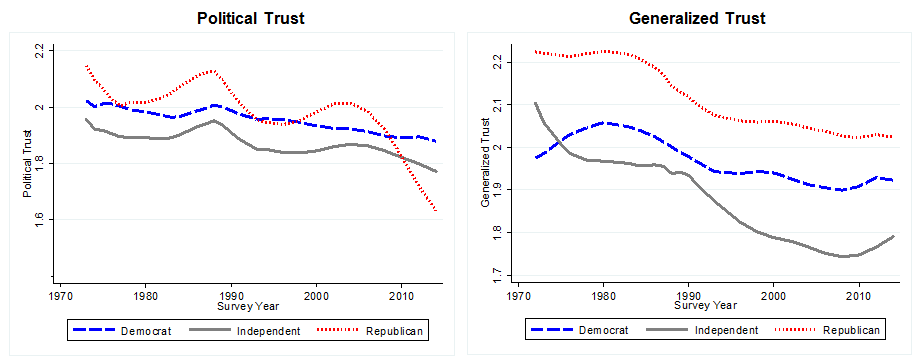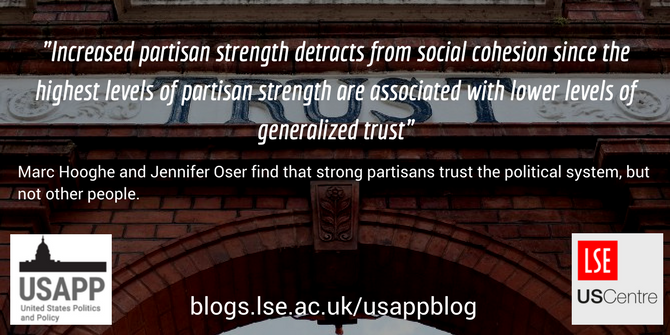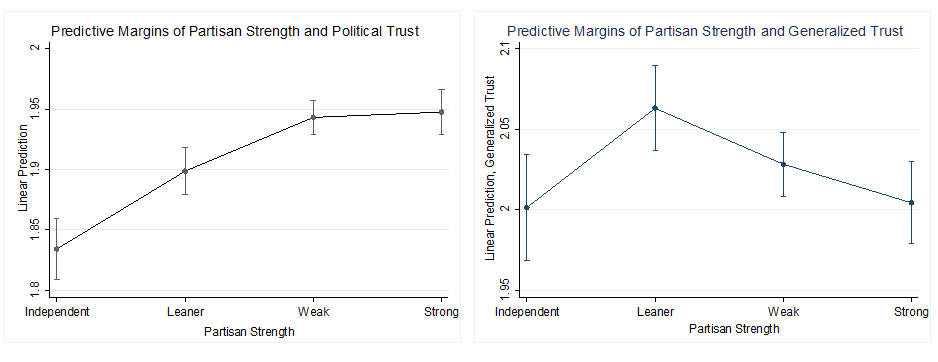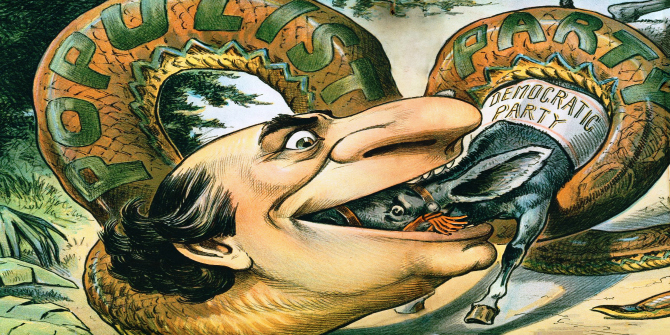
 Do we trust other people just like we trust the political system? For strong party supporters in the US, the answer is a resounding “no”. Drawing on General Social Survey data from between 1972 and 2014, new research by Marc Hooghe and Jennifer Oser shows that strong party supporters have high trust in the political system, but low trust in other people – regardless of whether they are Republicans or Democrats.
Do we trust other people just like we trust the political system? For strong party supporters in the US, the answer is a resounding “no”. Drawing on General Social Survey data from between 1972 and 2014, new research by Marc Hooghe and Jennifer Oser shows that strong party supporters have high trust in the political system, but low trust in other people – regardless of whether they are Republicans or Democrats.
Recent headlines can raise alarm bells that we have entered a wholly unprecedented era of partisan divides. In the current media environment, it’s worth remembering that these concerns are not brand new: already in 1787, James Madison warned that strong partisan sentiment could lead to a “mischief of factionalism.”
Public opinion data on topics of partisanship and trust does not stretch all the way back to Madison’s time, but in new research we draw on General Social Survey data from 1972 to 2014 to learn about how strong party support relates to trust of different kinds. By drawing on data from a four decade time period, we can assess whether there is indeed a trend toward increasing polarization, or whether this is a stable characteristic of the US party system. In particular, we investigate the relationship between partisan strength and two types of trust: political trust regarding the political system as a whole, versus generalized trust regarding how we relate to other people in society.
As we expected, the findings show that strong party support is positively related to political trust but negatively related to generalized trust. We were surprised to learn, however, that these relationships have not changed much in the United States between 1972 and 2014. Furthermore, our results show that these relationships hold equally true for Republicans and for Democrats. An important topic for future research will be to investigate whether the era of the Trump presidency is part of a broader change in trust dynamics as more data become available.
Trends in trust
Both in the media, as in scholarly research, there is a clear concern about eroding trust levels in US society. A clear conclusion from trend lines in Figure 1 is that no partisan group has experienced an increase in political trust or generalized trust in recent decades.
Figure 1 – Political and generalized trust by partisan group

Notes: Source is the GSS 1972-2014. Trust scales range from 1 to 3 for both political trust and generalized trust, and figures represent smoothed raw data with no controls (lowess smoothing). For additional information see article, Figure 2a (political trust) and Figure 2b (generalized trust).
The trend lines in Figure 1 tell us about the basic connection between partisanship and trust, but don’t yet take into account additional factors that we know can affect this relationship. For example, for generalized trust, research has shown that Republicans as a group have socio-demographic characteristics that would lead us to expect them to have higher overall levels of generalized trust (e.g., race, income, religious attendance). Controlling for these different background characteristics, we find that there is no significant difference between Republicans and Democrats in their levels of political and generalized trust over time.

“Trust” by Lars Plougmann is licensed under CC BY SA 2.0
We do find, though, that there is indeed a strong and linear relationship between partisan strength and political trust. As shown in the left-hand figure below, the lowest levels of political trust can be found among Independents and the highest level among those who identify strongly with a political party. There is a different trend, however, in the relationship between partisan strength and generalized trust, as shown in the right-hand section of Figure 2 below. For generalized trust, there is a modest increase for partisan leaners, but the strongest partisans have just as low levels of political trust as those who claim partisan independence.
Figure 2 – Partisan strength and trust

Notes: Source is the GSS 1972-2014. Figures plot predicted values of partisan strength on political trust and on generalized trust. For additional information see article, Figure 3 (political trust) and Figure 4 (generalized trust).
These figures contradict expectations that partisanship strength may have positive effects on generalized trust due to the role of political parties as important building blocks for contemporary society and democracy. In addition, the clear conclusion from our longitudinal analyses is that the contribution of increased partisan strength to a process of social polarization is not a new phenomenon, regardless of Americans’ specific party identity as Democrats or Republicans. To express it differently: the negative relation between partisanship and generalized trust was just as strong in 1972 as it was in 2014. We do not find evidence for a trend toward increased polarization among partisan lines.
Our findings support conclusions from prior research that a decline of partisan strength contributes to lower levels of political trust, which in turn, might erode popular support for government intervention. At the same time, the findings show that increased partisan strength does not increase all types of trust. In fact, the findings show that increased partisan strength detracts from social cohesion since the highest levels of partisan strength are associated with lower levels of generalized trust.
While political parties obviously constitute an important linkage mechanism between citizens and the political system, these findings confirm Madison’s long-ago concerns about the mischief of factionalism, as parties also embody and express social divisions.
- This article is based on the paper: Partisan strength, political trust and generalized trust in the United States: An analysis of the General Social Survey, 1972–2014 in Social Science Research.
Please read our comments policy before commenting.
Note: This article gives the views of the author, and not the position of USAPP – American Politics and Policy, nor of the London School of Economics.
Shortened URL for this post: http://bit.ly/2zCB5fT
_________________________________
About the authors
 Marc Hooghe – University of Leuven
Marc Hooghe – University of Leuven
Marc Hooghe is a full professor of political science at the University of Leuven in Belgium. He has published mainly on participation, political attitudes and the democratic linkage between citizens and the state.
 Jennifer Oser – Ben-Gurion University
Jennifer Oser – Ben-Gurion University
Jennifer Oser is an assistant professor of Politics and Government at Ben-Gurion University in Israel. Her research focuses on the relationship between public opinion, political participation, and policy outcomes.






